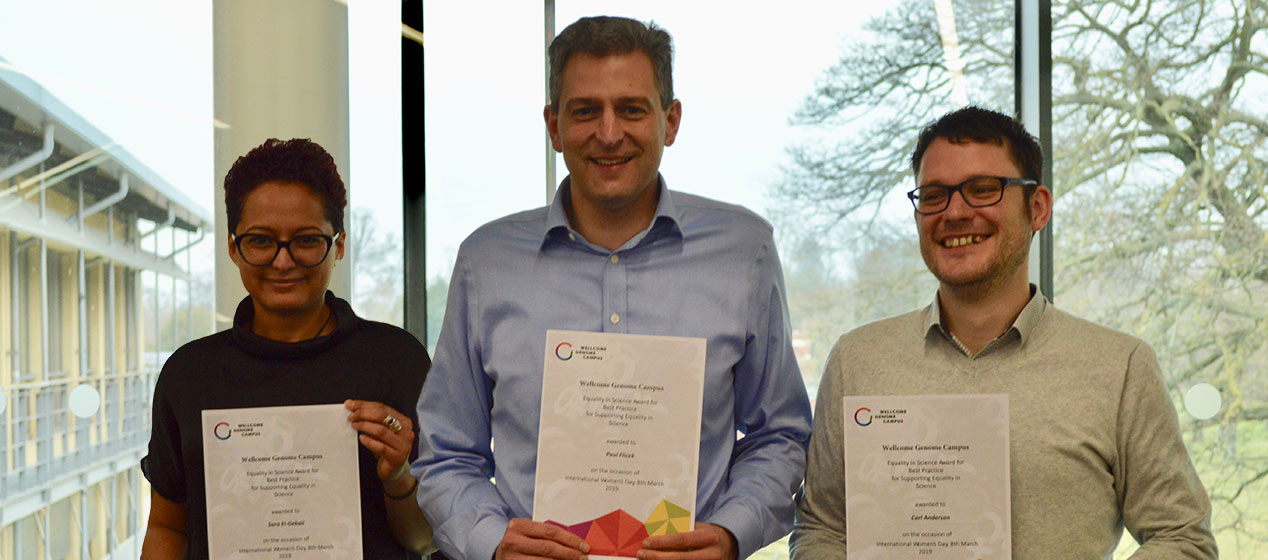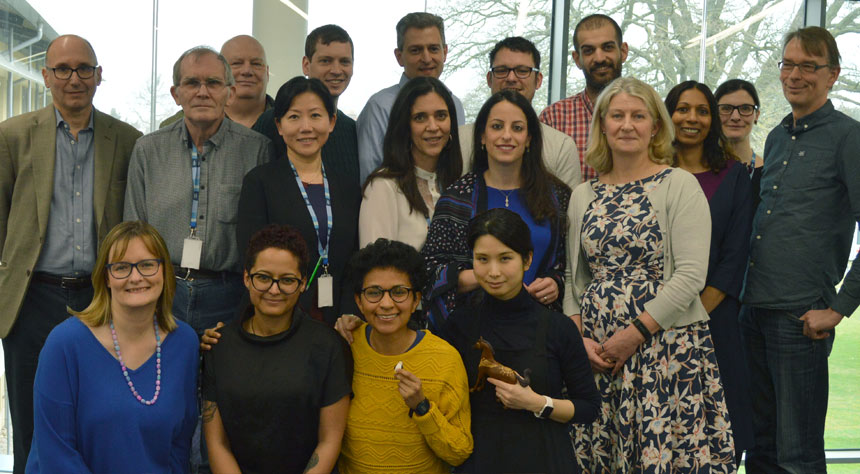Champions of equality and diversity celebrated

For International Women’s Day today (8 March) the Wellcome Genome Campus is celebrating its staff who lead the way in supporting equality and diversity in science. The day is being marked with its annual award for Best Practice for Supporting Equality and Diversity in Science.
Congratulations to this year’s joint winners: Sara El-Gebali and Paul Flicek from EMBL’s European Bioinformatics Institute and Carl Anderson from the Wellcome Sanger Institute.
Sara El-Gebali is a Scientific Database Curator at EMBL-EBI. She was nominated for her energy and hard work in supporting the establishment of the LGBT+ Campus Network. She has been instrumental in raising awareness and has been the driving force behind a wide range of initiatives, including LGBT+ in STEM Day and LGBT+ History Month.
“It was a bit of a shock! [to win this award] I was thinking, “No, I didn’t do enough, why are they giving this to me? There’s still a lot more to be done, I can’t just relax after this!” I was so full of emotions which made me feel that I can’t just sit back now, I have to do more. I’ve got to up the game. By receiving this award I feel motivated to continue in this work and to keep doing more for the LGBTQ+ community on campus.”
Sara El-Gebali Scientific Database Curator at EMBL-EBI
Paul Flicek is Senior Scientist and Team Leader, Vertebrate Genomics at EMBL-EBI. He was recognised for his ongoing and sustained activities across EBI in the areas of gender, equality and diversity. He provides championship of inclusivity issues at senior management level and works tirelessly to support and promote female leaders.
“It’s fantastic to see all the efforts of those supporting Equality and Diversity in science being recognised. This is something I think is really important and it’s great to see it being recognised through these awards.
“The work and science we do is better because of the diversity of the people who are working on it, and we are truly seeing the benefits of being an inclusive campus.”
Paul Flicek Senior Scientist and Team Leader, Vertebrate Genomics at EMBL-EBI
Carl Anderson, Group Leader and Director of Graduate Studies at the Sanger Institute was nominated for a Best Practice Award by multiple members of his team. Staff noted his work creating an inclusive, welcoming and supportive environment for everyone. Carl was also praised for his support of flexible working. He is recognised by many as a champion for gender equality and inclusivity.
“Winning this award means a lot to me. I’m really honoured, and touched, that people took the time to nominate me. I want people to be happy at work and enjoy their job, and so I think it’s important to support flexible working. I don’t believe that work should define us – it’s an important part of life, but it is only a part. I think we should recognise that and support people to achieve a healthy work/life balance.
“I feel especially honoured to be a male recipient of this award. Us men have to realise that we are a big part of the problem when it comes to inequality, and thus we need to play a big part in finding the solutions. I’m certainly going to do what I can to reduce inequality.”
Carl Anderson Group Leader and Director of Graduate Studies at the Wellcome Sanger Institute
All staff working at the Wellcome Genome Campus were invited to nominate a colleague for taking action to advance equality, diversity and inclusion which has brought about a positive impact on the working life of colleagues.
The judges also gave special commendations to: Alison King (Executive Assistant to the COO, Sanger Institute) for her support to her team and others with flexible working and parent carer responsibilities. Carla Jones (Post-Doctoral Fellow, Sanger Institute) and Maya Ghoussaini (Team Leader, Open Targets) for being the driving force behind the campus-wide Parent and Carers Network and their dedication and support to raising awareness, providing practical support and a platform for discussion and networking.

Full list of nominees: Saher Ahmed; Colin Barker; Karen Cafferkey; Phil Cook; Ian Dunham; Sara El-Gebali; Paul Flicek; Maya Ghoussaini; Martin Hemberg; Claudia Hernandez; Haruna Imamura; Carla Jones; Simon Kay, Alison King, Cordelia Langford; Revathi Nathaniel; Zachary O’Sullivan, Chris Peters; Grace Ping; Julian Rayner; Julia Wilson, Andy Yates.
“It’s wonderful to see that so many people were nominated and to see the hard work of all the nominees and winners being so well recognised and rewarded.”
Rolf Apweiler Joint Director of EMBL-EBI and senior scientist
“These awards are about celebrating the people who are working to reduce inequality and bring about positive change for others. The Wellcome Genome Campus is fully committed to supporting the career development of women and under-represented groups and I would like to congratulate everyone who was nominated.”
Professor Sir Mike Stratton Director of the Wellcome Sanger Institute and CEO of the Wellcome Genome Campus
More information
Selected websites
Equality, Diversity and Inclusion in Science programme
The European Bioinformatics Institute (EMBL-EBI)
The European Bioinformatics Institute (EMBL-EBI) is a global leader in the storage, analysis and dissemination of large biological datasets. We help scientists realise the potential of ‘big data’ by enhancing their ability to exploit complex information to make discoveries that benefit humankind. We are at the forefront of computational biology research, with work spanning sequence analysis methods, multi-dimensional statistical analysis and data-driven biological discovery, from plant biology to mammalian development and disease. We are part of EMBL and are located on the Wellcome Genome Campus, one of the world’s largest concentrations of scientific and technical expertise in genomics. www.ebi.ac.uk
Open Targets
Open Targets covers all aspects of human health and disease. The cornerstone of the collaboration is an agreement that experimental data and information gathered within the initiative will be shared openly, to benefit the broader scientific community. Open Targets welcomes new interest from companies and academic institutions that wish to accelerate the discovery of drug targets through open innovation. www.opentargets.org
Wellcome Genome Campus Connecting Science
Wellcome Genome Campus Connecting Science’s mission is to enable everyone to explore genomic science and its impact on research, health and society. We connect researchers, health professionals and the wider public, creating opportunities and spaces to explore genomic science and its impact on people. Connecting Science inspires new thinking, sparks conversation, supports learning and measures attitudes, drawing on the ground-breaking research taking place on the Wellcome Genome Campus. https://connectingscience.wellcomegenomecampus.org/
Wellcome Sanger Institute
The Wellcome Sanger Institute is one of the world’s leading genome centres.
Through its ability to conduct research at scale, it is able to engage in bold and long-term exploratory projects that are designed to influence and empower medical science globally. Institute research findings, generated through its own research programmes and through its leading role in international consortia, are being used to develop new diagnostics and treatments for human disease.
Find out more at scion-02.sandbox.sanger.ac.uk or follow @sangerinstitute on Twitter, Facebook, LinkedIn and on our Blog.


